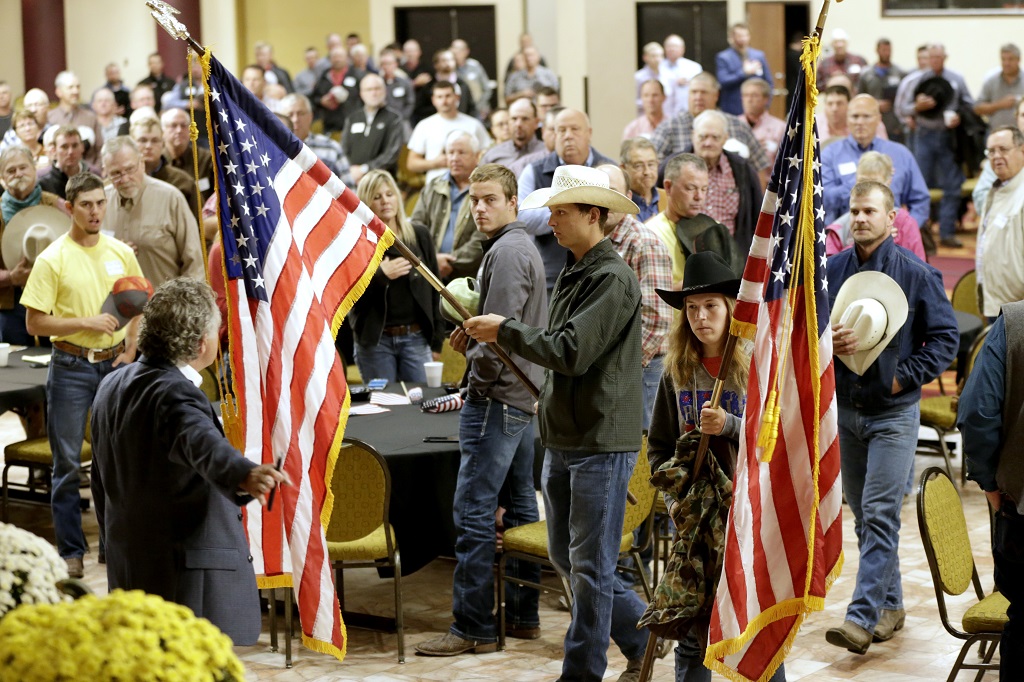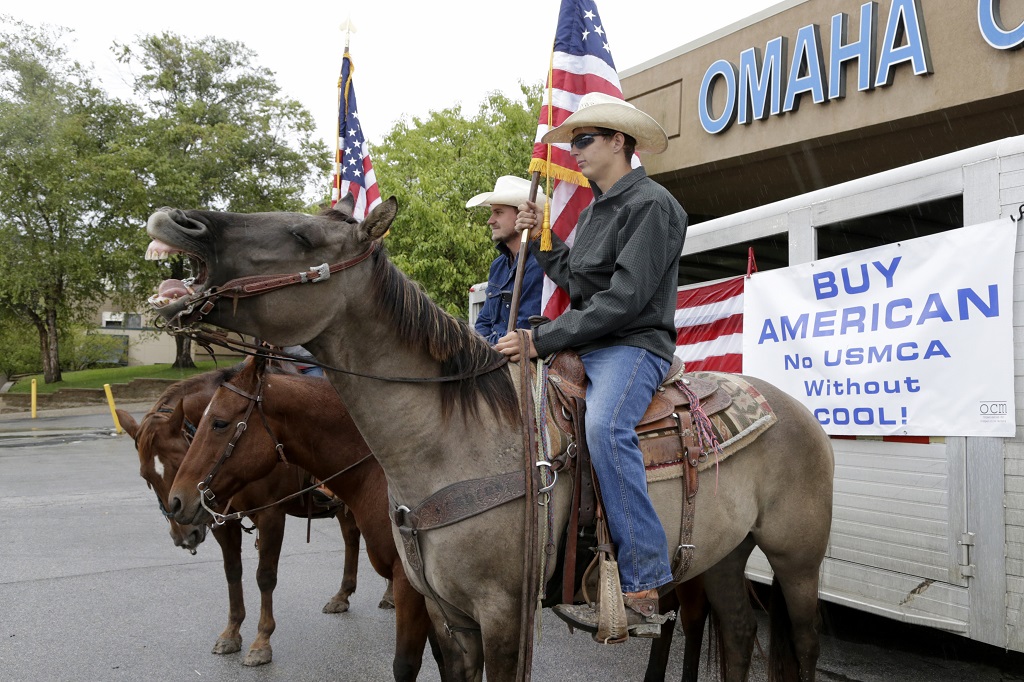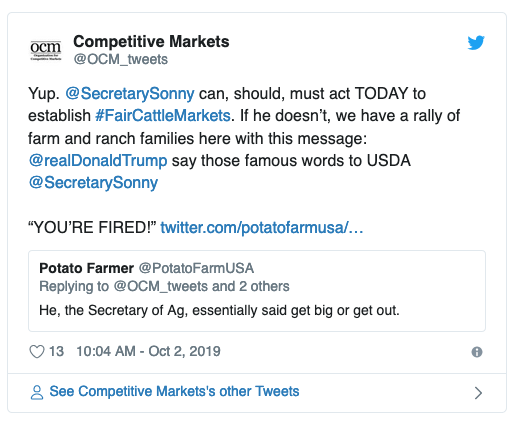New Food Economy: In Nebraska, cattle ranchers rally against big agribusiness
On Wednesday, 500 ranchers, cowboys, and feedlot owners from around the country filled the ballroom of the Ramada Inn in Omaha, Nebraska, for a “Rally To Stop the Stealin’”—an event that amounted to a fiery protest against corporate consolidation in agriculture. Hosted by the Organization for Competitive Markets (OCM), a nonprofit group that lobbies for antitrust reform, and sponsored by nearly two dozen other farm advocacy groups, the rally had two linked goals: To publicize the groups’ view that agribusiness monopolies have brought U.S. ranchers to the verge of extinction, and to beg President Donald Trump to intervene.
Participants joined together to call for six demands from Trump and his agriculture secretary, Sonny Perdue—measures they say would immediately improve market conditions and benefit ranchers, without requiring action from Congress. These demands, organized under two of the president’s sub-themes, “Buy American” and “Drain the Swamp of Corporate Monopoly Power,” included the restoration of Country of Origin Labeling (COOL) laws, and the closure of a loophole that allows foreign meat to be labeled “Product of U.S.A.” Other demands included stronger enforcement of producer protection safeguards, as well as reinstating the Grain Inspection Packers and Stockyards Administration (GIPSA), a now-shuttered government agency responsible for antitrust enforcement in the meatpacking industry.
To hear participants tell it, U.S. cattle ranching is in a state of national emergency. Four beef packers control over 80 percent of the domestic beef market. That power, some critics say, allows them to engage in predatory and unfair pricing practices that have driven down the number of independent cattle ranchers at a rate of 17,000 per year—a loss of about 40 percent since the 1980s. Today, just over 700,000 remain, though they make an average of 90 percent of their income off the farm. But even in this context, 2019 has been an especially rough year.

At Wednesday’s rally, attendees fought to maintain a unified focus on ranching issues
In August, a major Tyson Foods plant in Holcomb, Kansas caught fire, limiting the region’s slaughter capacity, and leaving many ranchers desperate to sell their animals. The incident capped off several years of declining prices and producer losses, and resulting financial woes have provoked a new, somewhat more existential fear: According to Secretary Perdue, the United States Department of Agriculture [USDA] is currently investigating whether the Holcomb fire betrayed any “evidence of price manipulation, collusion, restrictions of competition or other unfair practices.” Then, shortly before the rally began, Perdue, the event’s ostensible savior, became the subject of its ire. On Monday, speaking at a Wisconsin dairy, he suggested that farmers should “get bigger” or “go out,” a remark some of those present construed as a lack of support for family farmers. By the time the “Rally to Stop the Stealin’” started, some groups in attendance were already calling for his firing.
While the ballroom was packed and the rally’s attendance surpassed the expectations of the organizers, the crowd—many dressed in cowboy hats, plaid, and denim—was placid. Attendees watched while leaders of the organizations spoke at length, recounting the intricacies of the alleged market manipulation, abuse of “checkoff program” dollars, and denouncement of Secretary Perdue’s dismissive comments from the previous days, with much mention of an insensitive joke he made about farmers late this summer.
The secretary was addressed directly by OCM board member David Wright. “You need to get out of bed with the folks you are supposed to regulate—the packers—and get back on the side you’re supposed to support,” he said, “or your boss should say those famous words: ‘You’re fired.’” Even that pointed remark failed to illicit a loud response from those gathered. Several speakers tried to rouse the crowd, noting the muted atmosphere of an event convened to “raise hell.” One suggested:
“If you wanna say, ‘yeah,’ or ‘hell yeah . . .’ We’re at a rally, aren’t we?”
Organizers trained farmers to use the hashtag #FairCattleMarkets in an effort to flood the president’s Twitter feed, hoping to communicate with him directly via his platform of choice. Despite anger at Perdue’s comments and the administration in general, the ranchers and feeders present seemed to hold firm on their loyalty to President Trump. “We’re not here to cuss Trump, are we?” asked Corbitt Wall, a cattle market analyst and internet personality. “I’m not or I wouldn’t have showed up.” Wall credited the president for the fact that beef exports have recently risen. “He’s trying to get something done. He can’t do it all,” Wall said. “We’re looking for government intervention here. How sad is that?”
During Wall’s talk, which lasted about 45 minutes, his loyalty to the president came into even sharper relief during a brief digression that included insensitive comments bordering on racist and transphobic. Those few short minutes grabbed more attention than any speech the entire afternoon. Wall likened the logo of Beyond Meat, the alternative protein company, to “a steer head dressed in drag,” and suggested that the people of China need to eat more U.S. beef to grow above shoulder height and “win at the Olympics at something that’s not ping-pong.”
He also insulted a prominent U.S. congresswoman. “That Ocasio-Cortez lady tells says that cow farts are killing the environment, and people listen to her. That’s scary. She’s a buck-toothed bartender, and that’s it,” he said, speaking of the freshman democratic representative from New York’s 14th district. That line got resounding applause from the otherwise reserved, quiet room.
Three staff present from Family Farm Action, OCM’s political arm, unequivocally condemned the language used by Wall, saying they were “caught off guard” by his comments, and that they were “emphatically not what we stand for.” Despite some vague appeals to unity by a handful of speakers, the resulting friction may now preclude constructing a coalition with more progressive groups that share similar political goals. Among those are the environmental advocacy nonprofit Food and Water Watch, a frequent collaborator of OCM’s and sponsor of the rally, and the Ranchers Cattlemen Action Legal Fund-United Stockgrowers Of America (R-CALF), an organization that advocates on behalf of U.S. ranchers, and cites cultural differences as a barrier to deeper coalition-building.
“We have to figure out how to get [environmental folks and cowboys] to sit in a room and point the finger on the true enemy.”
David Muraskin, an attorney for the Food Project of Public Justice, a nonprofit that takes legal action to advance the issues highlighted by the day’s rally, is familiar with this tension. He sees COOL—the rally’s flagship demand—as an opportunity for a broader movement, one that is currently being missed.

